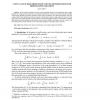184 search results - page 11 / 37 » An optimal adaptive mixed finite element method |
CGF
2008
13 years 8 months ago
2008
Finite element simulations in computer graphics are typically based on tetrahedral or hexahedral elements, which enables simple and efficient implementations, but in turn requires...
JSCIC
2010
13 years 3 months ago
2010
In this paper we present the continuous and discontinuous Galerkin methods in a unified setting for the numerical approximation of the transport dominated advection-reaction equati...
PROCEDIA
2010
13 years 3 months ago
2010
We argue that producing maintainable high-performance implementations of finite element methods for multiple targets requires that they are written using a high-level domain-speci...
SIAMNUM
2010
13 years 3 months ago
2010
In the numerical simulation of many practical problems in physics and engineering, finite volume methods are an important and popular class of discretization methods due to the loc...
FOCM
2002
13 years 8 months ago
2002
This paper is concerned with the design and analysis of adaptive wavelet methods for systems of operator equations. Its main accomplishment is to extend the range of applicability...



